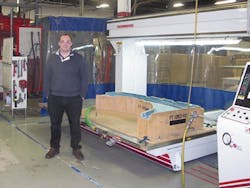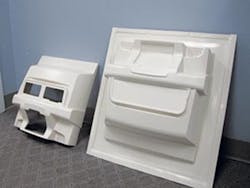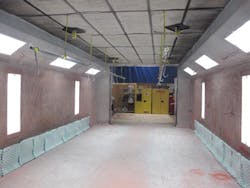Thermoformer Productive Plastics goes state-of-the-art
The Internet of Things (IoT) is making its way into heavy-gauge thermoforming, and custom former Productive Plastics Inc., Mount Laurel, N.J., is making sure it stays on the cutting edge.
The company recently purchased two heavy-gauge thermoforming machines from Maac Machinery Corp., Carol Stream, Ill., replete with state-of-the-art sensors that allow the user to confirm that the process is under control. The data can be used to spot performance trends, establish a maintenance schedule or tie into part production, shipping, inventory and work schedules.
Being able to purchase the sensor technology from the machinery maker is an indication that thermoforming companies are beginning to enhance their process through automation, COO Evan Gilham said. The company also is using the sensors to quickly determine if a problem that disrupts a process originates with workers, machinery or materials.
To meet the goals of lean manufacturing, make the most of automation opportunities and take advantage of IoT, the company chose to standardize its machinery and equipment. The company makes its investment decisions based on its adherence to the Toyota Production System (TPS) business concept and lean manufacturing principles.
Productive Plastics operates six manufacturing cells. Each cell comprises a thermoforming machine from Maac, CNC equipment from Thermwood Corp., Dale, Ind., and a customizable assembly area, Gilham said. The company's latest purchases include a 4-foot-by-6-foot single-station machine that was recently installed. The company is awaiting delivery of a three-station rotary machine of the same size.
The company's large, heavy-gauge parts (ranging from 0.125-inch to 0.5-inch thick) are geared to compete with injection molded parts and parts made of fiberglass-reinforced plastics, thermoset sheet molding compound and fabricated metal. Much of Productive Plastics' manufacturing focuses on big, durable parts for medical, transportation and industrial products, such as medical scanners and vehicle seating assemblies, luggage racks, door panels and window frames. Industrial parts include ATMs, retail kiosks and engine hoods for forklifts.
"Very little of our business comes from a customer looking only to gain margin, although sometimes it is our value-added services that can generate a lower overall production cost for them. It is the customer that has a problem they are trying to fix, that another thermoformer was not able to do, that is a proposition to us," Gilham said.
The company offers both vacuum and pressure forming. Its expertise includes twin-sheet, large-part prototyping and custom work. For example, Productive Plastics developed an alternative to twin-sheet forming in which two sheets of different materials are bonded together, sometimes with a metal insert incorporated into the multilayered sheet. The sheet bonding approach Productive Plastics developed is one of its value-added capabilities.
Additional innovations include the adoption of robotic automation. Last year, the company purchased its first robot-driven part-trimming cell. The cell includes a six-axis robot from Fanuc America Corp., Rochester Hills, Mich., that automatically recognizes the part to be trimmed, Gilham said.
FROM WOOD TO PLASTICS
The company's initial offerings were simpler than the sophisticated processes and products it offers today. Jim Gilham, Evan's grandfather, established the company in 1955 in Runnemede, N.J., as a woodworking shop called Productive Wood Inc. It also made tools and fiberglass products.
The company's success forming items like a fiberglass cover for the concrete foundation of a building exposed Productive Plastics to competing technologies. This stirred the company founder's interest in thermoforming. In the late 1970s, Gilham moved the company from his garage and into an 18,000-square-foot building in Runnemede. This occurred after he "purchased a used AAA-brand thermoforming machine that was installed in a chicken coop in Pennsylvania, changed the company name to Productive Plastics and started to form parts for local customers" from PVC/acrylic sheet, Gilham said.
The company realized early that the thermoforming process is difficult, made up of steps that can make production inconsistent. By using the ideologies of TPS and lean manufacturing, Productive Plastics was soon able to identify key steps in the process that led to waste and defects.
The company used TPS to identify eight areas where waste can occur. They include unnecessary movements by workers or products; underutilization of people's skills and knowledge; overprocessing (making products of a higher quality than is needed); overproduction of the part and excess inventory; and defects caused by incorrect information.
Productive Plastics documented every step in every process. It developed standard work instructions for jobs and processes, identified bottlenecks and optimized each process step for maximum efficiency. "Value-stream mapping allowed us to track where the value is in the business and what is waste. That helped us target the areas with the greatest optimization opportunity," Gilham said. Value-stream mapping involves tracking a company's partially finished goods and their value.
Embracing lean manufacturing principles helped Productive Plastics implement a continuous flow concept within and between work cells. This trimmed machine changeover and set-up times by 30 percent and reduced the factory's inventory of finished goods and parts in progress. The company established and continually reviews rules for personnel, as well as standards relating to handling and operating the tooling, forming machines and thermoforming ovens, Gilham said.
"Many companies spend months developing their core values, vision statements and quality goals. They put their intentions on a plaque and placed it prominently in the office, then did nothing further. We wanted to be different, so we committed to lean principles and changing the culture of the business. Everything we do strives to eliminate waste or add value," Gilham said.
IMPROVING EFFICIENCY THROUGH UPGRADES
Based on lean manufacturing principles, Productive Plastics measured and made adjustments to equipment and tooling to improve operations. For example, officials designed a physical stop that they placed in the platens to consistently center and locate the tool. They added a device to the machines to measure the volume of available vacuum and reduced the number of pre-draw vacuum settings to just two selections to minimize mistakes. They then purchased a device that measures the tool temperature at specific points and provides a thermal image of the entire tool for consistent sheet processing.
On the thermoforming machines, they developed standard timer settings that were applied to forming time, platen sequence, cooling and demolding. They created a scale that measures the height of the platens and incorporated switches into the motors driving platen movement to record their operation and check settings. For workers, Productive Plastics developed standard work set-up and operations pages that provide the specific settings to enter and the specific outputs to be measured. The company trained operators to understand the process and material behavior.
After applying lean manufacturing to its process, Productive Plastics saw defects reduced by 75 percent; changeover and set-up times cut from 3.26 hours to 1.75 hours; and overall inventory decreased by 30 percent.
MORE THAN JUST PART FORMING
The company, which moved in 1999 from a 34,000-square-foot site in Mount Laurel to its current 68,000-square-foot building, continued to add technologies to its operations to provide even more services to its customers.
For example, it can perform an array of downstream finishing operations, including part-insertion and assembly operations. Lean principles provide a structured, consistent way for Productive Plastics to install an insert or attachment to a sheet.
Quality-control checks occur in-process, which greatly reduced the post-forming quality-control steps in each manufacturing cell. With greater process control, the company can better manage part quality. "We still carry out first-article inspection, first-product release and checks like that. But 80 to 90 percent of the products we make are validated in the machinery cell, boxed up right after molding and trimming and ready to go," Gilham said.
For greater efficiency, Productive Plastics reorganized its floor space, reclaiming 5,000 square feet from its shop floor. The machinery cells are arranged in linear and horseshoe patterns, Gilham said. Optimizing the machine configurations provided the space for the company to install value-added technologies that allow it do more than just thermoform. They include an oven and paint room, where the company can paint the parts it thermoforms.
A box-making machine on site lets the company generate the correct size of packaging for its products, rather than holding special packaging in inventory.
Productive Plastics' facility also features separate manufacturing spaces for part buffing and polishing operations, and tool and part inventory. Daily meetings to discuss projects, machinery cell performance, scheduling and other issues take place in an operations room between the administration area and the manufacturing floor.
Officials see the efforts paying off. Over the last three years the company's sales have grown by double digits. "Our goal is to be just over $12 million this year," Gilham said. The company employs 65 people and operates two shifts five days a week.
The company hired four engineers and promoted a person from the quality department to a sales post. Several of the engineering roles did not exist two years ago, he said.
Mikell Knights, senior staff reporter
Contact:
Productive Plastics Inc.Mount Laurel, N.J., 856-778-4300, www.productiveplastics.com






